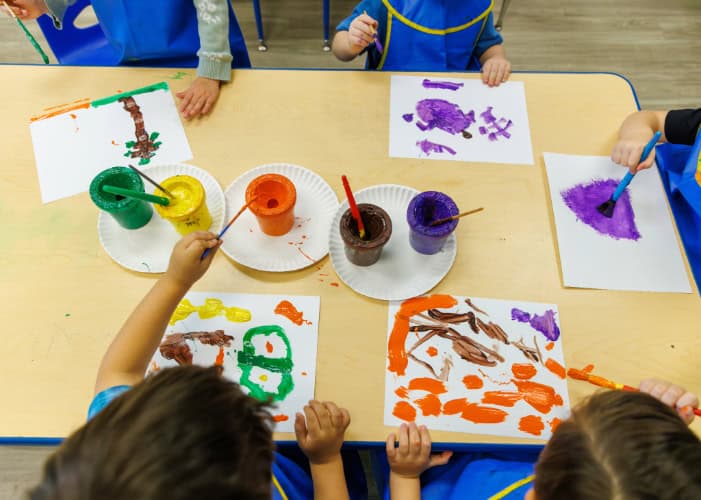
The world is rapidly changing, and so are the skills our children need to thrive. For preschoolers in 2025, developing essential skills early on is more important than ever. From reading and language development to managing emotions like child anger issues, building a solid foundation now ensures they’re ready for future challenges. Here’s a look at the key skills to focus on for your preschooler this year.
1. Building Strong Language Skills
Language is the key to communication, connection, and learning. Preschoolers need to develop language skills early on to build a strong vocabulary, engage in conversations, and better express themselves. Here are some ways to foster language development:
- Read Daily: Make kid reading a part of your daily routine. Choose age-appropriate books with colorful illustrations and engaging stories. Reading together helps strengthen vocabulary, comprehension, and listening skills.
- Encourage Conversations: Ask open-ended questions to prompt your child to speak more. For example, “What was your favorite part of the day?” helps them practice verbal expression and recall.
- Teach Through Play: Interactive games, rhymes, and songs are great ways to introduce new words and concepts.
2. Teaching Reading: A Foundational Skill for Success
Teaching reading skills to preschoolers gives them a major head start for school. Reading boosts cognitive development, builds focus, and creates a love for learning. To help your child develop strong reading skills:
- Phonics and Sight Words: Introduce basic phonics and common sight words. Games, flashcards, and interactive reading apps can make learning fun.
- Create a Kid-Friendly Reading Corner: Designate a special spot in your home for kid reading activities. Stock it with books, cushions, and fun reading tools to make reading feel exciting and rewarding.
- Lead by Example: Let your child see you reading. Whether it’s a book, a magazine, or even a recipe, showing enthusiasm for reading will inspire them to enjoy it too.
3. Developing Social and Emotional Skills
Navigating emotions and building relationships are crucial for preschoolers. Learning to manage their feelings, like child anger issues, helps them interact positively with peers and adults.
- Teach Emotional Regulation: Help your child name and understand their feelings. If they’re angry, encourage them to express it verbally: “I see that you’re upset. Let’s talk about it.” Teaching them to use words to express emotions reduces frustration.
- Use Calm-Down Strategies: Introduce tools like breathing exercises, sensory bottles, or a calm-down corner for when they feel overwhelmed.
- Model Empathy and Kindness: Encourage role-playing and pretend play to help your child understand different perspectives and develop empathy for others.
4. Encouraging Fine and Gross Motor Skills
Motor skills are key to your child’s physical development and coordination. Fine motor skills involve small movements (like writing and using scissors), while gross motor skills involve larger movements (like running and jumping).
- Play with Purpose: Activities like coloring, cutting with child-safe scissors, stacking blocks, and simple crafts improve fine motor skills.
- Get Moving: Encourage outdoor play like running, jumping, and climbing. Dancing, obstacle courses, and sports build coordination and strength.
5. Promoting Early Math and Problem-Solving Skills
Preschoolers are naturally curious, making it the perfect time to introduce early math concepts and critical thinking skills.
- Count Everything: Incorporate counting into everyday activities—snacks, toys, steps, you name it! This helps children recognize numbers and understand basic counting.
- Puzzles and Building Blocks: Puzzles encourage problem-solving and critical thinking, while building blocks teach spatial awareness, shapes, and patterns.
- Sorting and Patterns: Ask your child to sort objects by color, shape, or size. This simple task builds early math skills and classification abilities.
6. Nurturing Creativity and Imagination
Creativity fuels learning and growth. It allows children to explore, express themselves, and think outside the box.
- Art Projects: Give your child access to crayons, paint, and craft materials. Let them create freely to foster self-expression.
- Imaginative Play: Role-play with dolls, costumes, or even kitchen sets encourages creativity and storytelling.
- Music and Dance: Singing, dancing, and playing instruments can be wonderful ways to encourage creativity and improve memory, rhythm, and coordination.
7. Introducing STEM Activities Early
Science, Technology, Engineering, and Math (STEM) are essential skills for the future. Early exposure can lay the groundwork for a lifelong interest in these fields.
- Simple Science Experiments: Explore basic science concepts like floating vs. sinking with water play, or mixing colors to see changes.
- Building and Construction Toys: LEGO sets, magnetic tiles, and other building toys develop engineering and spatial skills.
- Coding for Kids: Simple coding apps and games designed for preschoolers introduce the basics of coding logic.
8. Cultivating a Love for Nature
Connecting children with nature has numerous benefits, from boosting their physical health to enhancing focus and reducing stress.
- Outdoor Exploration: Take nature walks, collect leaves, and observe insects to spark curiosity and learning.
- Gardening: Planting seeds and watching them grow teaches responsibility, patience, and a sense of wonder about the natural world.
Help Your Child Develop Key Skills this Year!
Giving preschoolers the gift of reading, developing strong language skills, and learning to manage emotions like child anger issues sets them on a path to success. By focusing on these key skills in 2025, you’re not just preparing your child for school—you’re preparing them for life.
Make the early years count by fostering curiosity, empathy, and a love for learning that will carry them far beyond preschool!
Want to learn more about how you can help your child thrive? Sign up for our newsletter to receive monthly advice, tips, and strategies to help you empower your child.


